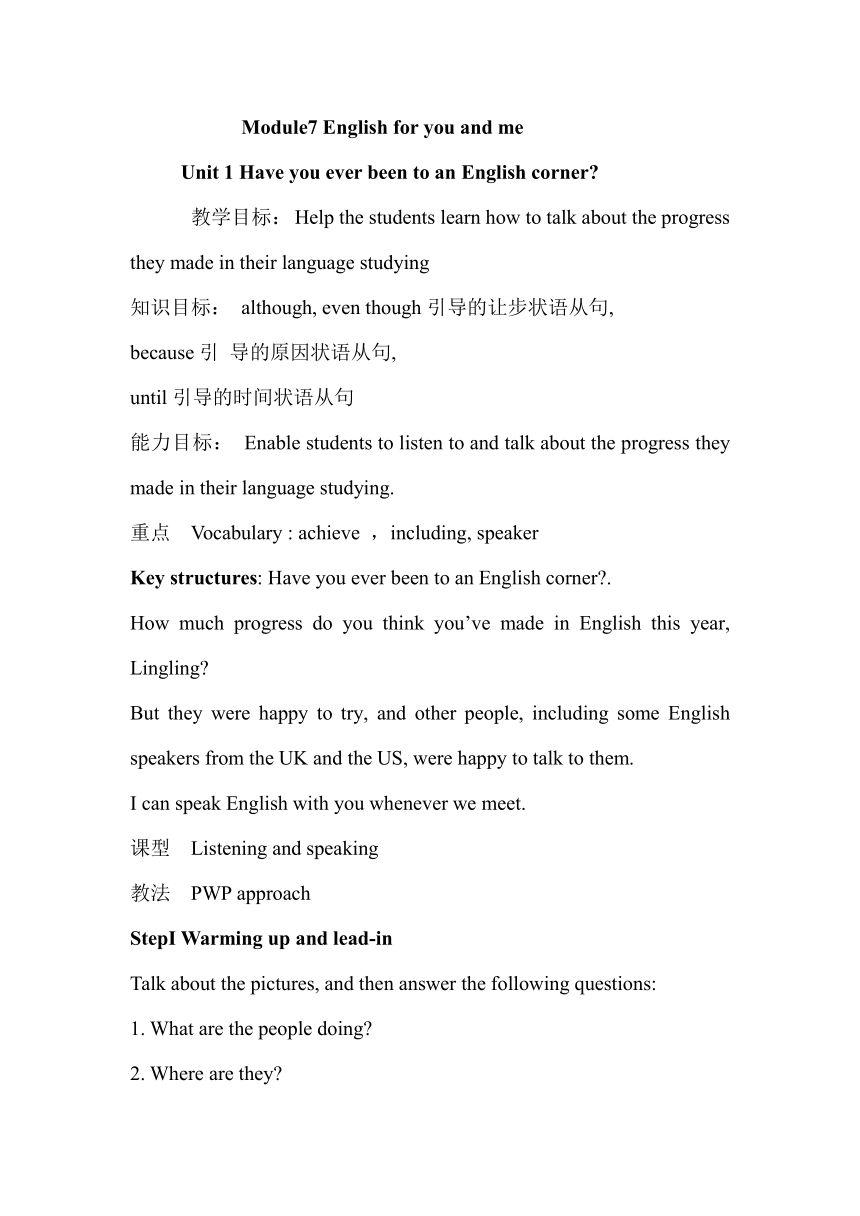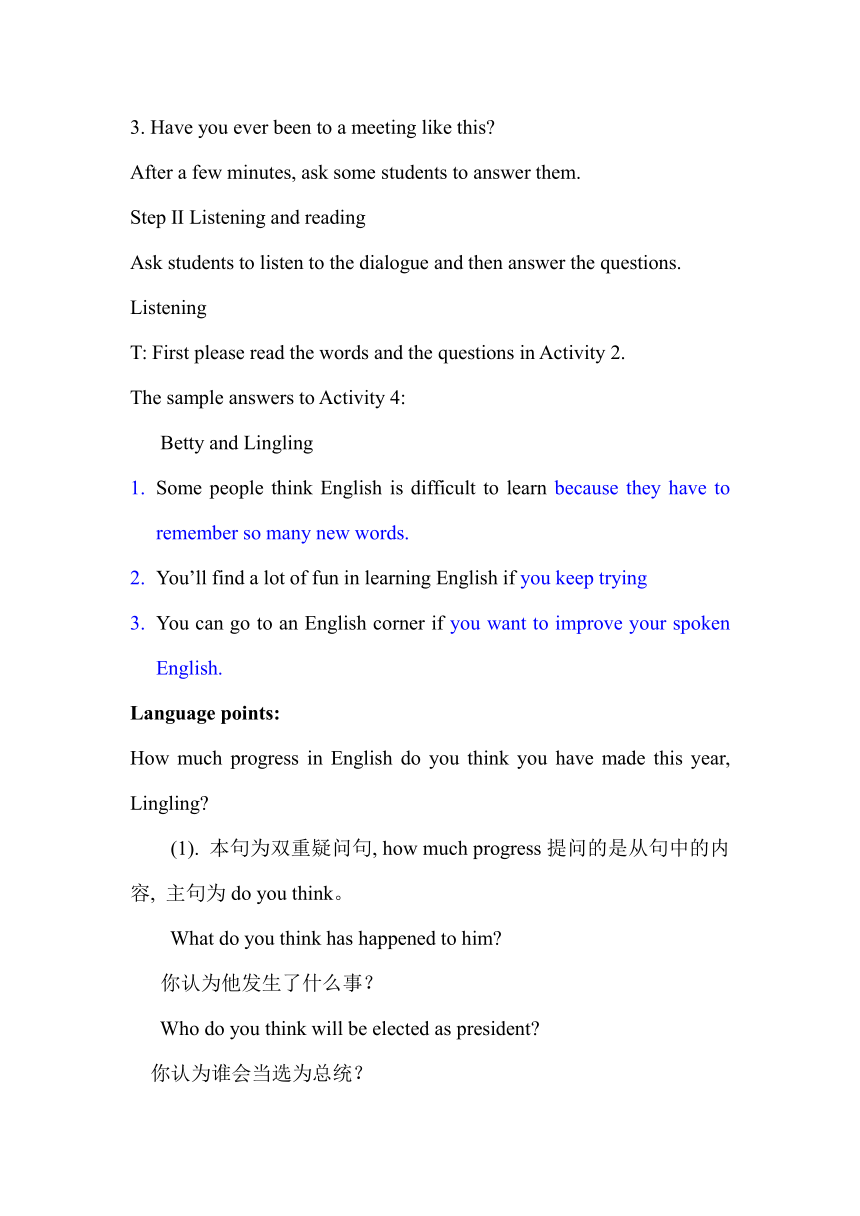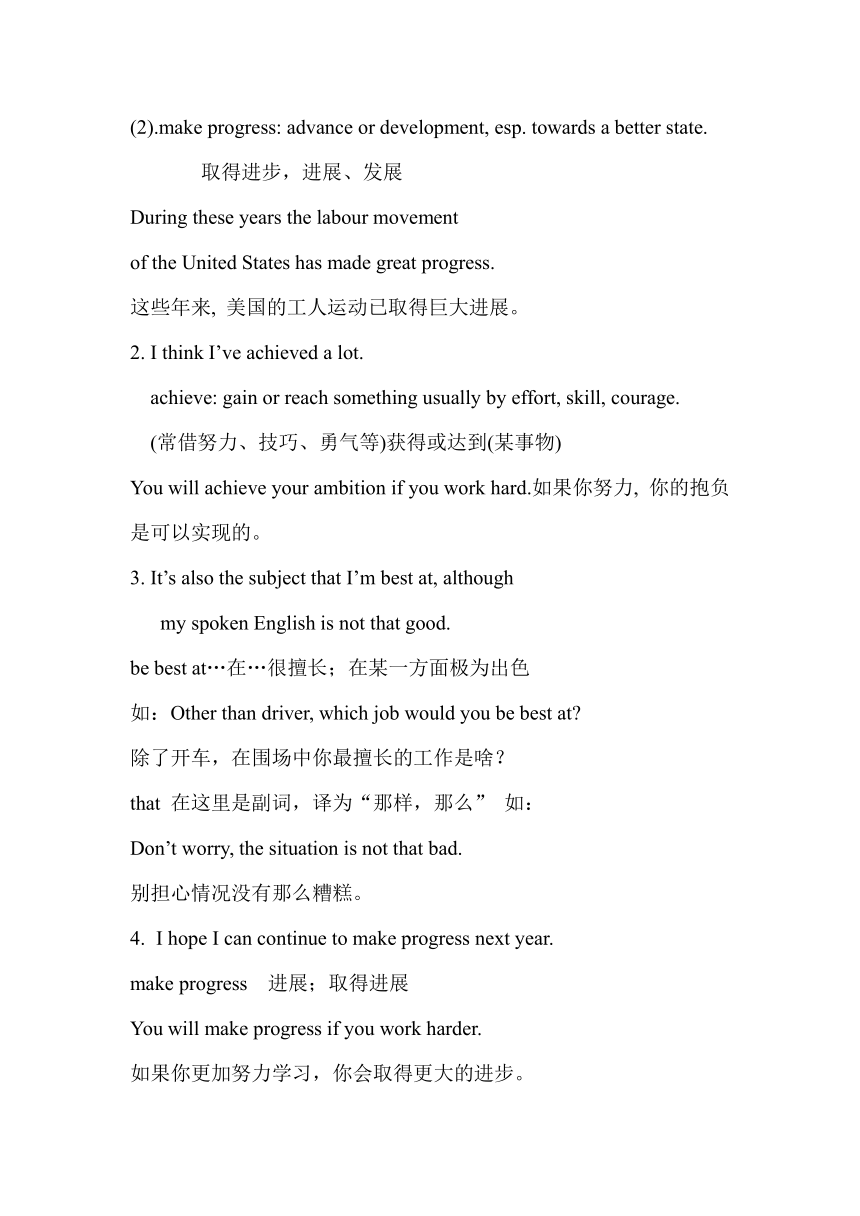外研版九年级下册Module 7 English for you and me Unit 1教案
文档属性
| 名称 | 外研版九年级下册Module 7 English for you and me Unit 1教案 |

|
|
| 格式 | doc | ||
| 文件大小 | 34.5KB | ||
| 资源类型 | 教案 | ||
| 版本资源 | 外研版 | ||
| 科目 | 英语 | ||
| 更新时间 | 2022-08-20 21:27:09 | ||
图片预览



文档简介
Module7 English for you and me
Unit 1 Have you ever been to an English corner
教学目标: Help the students learn how to talk about the progress they made in their language studying
知识目标: although, even though引导的让步状语从句,
because引 导的原因状语从句,
until引导的时间状语从句
能力目标: Enable students to listen to and talk about the progress they made in their language studying.
重点 Vocabulary : achieve ,including, speaker
Key structures: Have you ever been to an English corner .
How much progress do you think you’ve made in English this year, Lingling
But they were happy to try, and other people, including some English speakers from the UK and the US, were happy to talk to them.
I can speak English with you whenever we meet.
课型 Listening and speaking
教法 PWP approach
StepⅠ Warming up and lead-in
Talk about the pictures, and then answer the following questions:
1. What are the people doing
2. Where are they
3. Have you ever been to a meeting like this
After a few minutes, ask some students to answer them.
Step Ⅱ Listening and reading
Ask students to listen to the dialogue and then answer the questions.
Listening
T: First please read the words and the questions in Activity 2.
The sample answers to Activity 4:
Betty and Lingling
1. Some people think English is difficult to learn because they have to remember so many new words.
2. You’ll find a lot of fun in learning English if you keep trying
3. You can go to an English corner if you want to improve your spoken English.
Language points:
How much progress in English do you think you have made this year, Lingling
(1). 本句为双重疑问句, how much progress提问的是从句中的内容, 主句为do you think。
What do you think has happened to him
你认为他发生了什么事?
Who do you think will be elected as president
你认为谁会当选为总统?
(2).make progress: advance or development, esp. towards a better state.
取得进步,进展、发展
During these years the labour movement
of the United States has made great progress.
这些年来, 美国的工人运动已取得巨大进展。
2. I think I’ve achieved a lot.
achieve: gain or reach something usually by effort, skill, courage.
(常借努力、技巧、勇气等)获得或达到(某事物)
You will achieve your ambition if you work hard.如果你努力, 你的抱负是可以实现的。
3. It’s also the subject that I’m best at, although
my spoken English is not that good.
be best at…在…很擅长;在某一方面极为出色
如:Other than driver, which job would you be best at
除了开车,在围场中你最擅长的工作是啥?
that 在这里是副词,译为“那样,那么” 如:
Don’t worry, the situation is not that bad.
别担心情况没有那么糟糕。
4. I hope I can continue to make progress next year.
make progress 进展;取得进展
You will make progress if you work harder.
如果你更加努力学习,你会取得更大的进步。
We have made great progress in protecting
environment.
我们在保护环境和方面已经取得了很大的进步。
Grammar Points
状语从句
用一个句子(从句)来作另一个句子(主句)
的状语, 用作状语的句子就叫作状语从句。
作什么样的状语就叫什么类型的状语从句。
例如:
条件状语从句就是用一个句子来作条件
状语。
二. 状语从句的分类及连词
1). 时间状语从句连词: when, before, after, until, as soon as, as, while 等。
2). 条件状语从句连词: if
3). 地点状语从句:
常用where(哪里)和wherever(无论哪里)引导。
4). 原因状语从句:
常用的引导连词有because, as和since,三者的区别是:在回答问题的时候,使用because;对于显而易见的原因,常用as或since。as和since的从句常放在主句之前,而because的从句常放在主句之后。
5). 目的状语从句:
常用的引导连词有so that, that和in order
that 译为:以便, 为了, 目的是。
6)让步状语从句:although, though
7)比较状语从句: than; as
8)结果状语从句: so…that…;such…that…
The Attributive Clause
定语从句
定语从句的概念
用作定语的从句叫做定语从句。
定语从句通常置于它所修饰的名词(或代词)之后,这种名词(或代词)叫做先行词。引导定语从句的关联词为关系代词和关系副词。关系代词(who,whom, whose,that,which等)在定语从句中可用作主语、定语、宾语等;关系副词(when,where,why等)在定语从句中只用作状语。
II. 关系代词
先行词 关系代词用: 在定从中充当的成分
人
who 主 / 宾
whom 宾
人/物 that 主/宾
物 which 主/宾
人/物 whose
=of whom/which 定语
II. 关系副词
先行词 关系副词用: 在定从中充当的成分
时间
名词 when
=at/in/on which 时间状语
地点
名词 where
=at/in/on which 地点状语
原因
名词 why
=for which 原因状语
Step Ⅲ Pair work
Step Ⅳ Pronunciation and speaking
Pronunciation
Ask students to listen to and then read the passage in Activity 7.
Speaking
T: It’s time to show you to everyone. According to Activity 9, you should work in pairs, talking about your progress in English vocabulary, grammar, listening, speaking, reading and writing. You can turn to the answers to Activity 6.
Step Ⅴ Homework
1. Ask students to learn the vocabulary and key sentences by heart.
2. Ask students to make a dialogue about the progress in their English studying.
Unit 1 Have you ever been to an English corner
教学目标: Help the students learn how to talk about the progress they made in their language studying
知识目标: although, even though引导的让步状语从句,
because引 导的原因状语从句,
until引导的时间状语从句
能力目标: Enable students to listen to and talk about the progress they made in their language studying.
重点 Vocabulary : achieve ,including, speaker
Key structures: Have you ever been to an English corner .
How much progress do you think you’ve made in English this year, Lingling
But they were happy to try, and other people, including some English speakers from the UK and the US, were happy to talk to them.
I can speak English with you whenever we meet.
课型 Listening and speaking
教法 PWP approach
StepⅠ Warming up and lead-in
Talk about the pictures, and then answer the following questions:
1. What are the people doing
2. Where are they
3. Have you ever been to a meeting like this
After a few minutes, ask some students to answer them.
Step Ⅱ Listening and reading
Ask students to listen to the dialogue and then answer the questions.
Listening
T: First please read the words and the questions in Activity 2.
The sample answers to Activity 4:
Betty and Lingling
1. Some people think English is difficult to learn because they have to remember so many new words.
2. You’ll find a lot of fun in learning English if you keep trying
3. You can go to an English corner if you want to improve your spoken English.
Language points:
How much progress in English do you think you have made this year, Lingling
(1). 本句为双重疑问句, how much progress提问的是从句中的内容, 主句为do you think。
What do you think has happened to him
你认为他发生了什么事?
Who do you think will be elected as president
你认为谁会当选为总统?
(2).make progress: advance or development, esp. towards a better state.
取得进步,进展、发展
During these years the labour movement
of the United States has made great progress.
这些年来, 美国的工人运动已取得巨大进展。
2. I think I’ve achieved a lot.
achieve: gain or reach something usually by effort, skill, courage.
(常借努力、技巧、勇气等)获得或达到(某事物)
You will achieve your ambition if you work hard.如果你努力, 你的抱负是可以实现的。
3. It’s also the subject that I’m best at, although
my spoken English is not that good.
be best at…在…很擅长;在某一方面极为出色
如:Other than driver, which job would you be best at
除了开车,在围场中你最擅长的工作是啥?
that 在这里是副词,译为“那样,那么” 如:
Don’t worry, the situation is not that bad.
别担心情况没有那么糟糕。
4. I hope I can continue to make progress next year.
make progress 进展;取得进展
You will make progress if you work harder.
如果你更加努力学习,你会取得更大的进步。
We have made great progress in protecting
environment.
我们在保护环境和方面已经取得了很大的进步。
Grammar Points
状语从句
用一个句子(从句)来作另一个句子(主句)
的状语, 用作状语的句子就叫作状语从句。
作什么样的状语就叫什么类型的状语从句。
例如:
条件状语从句就是用一个句子来作条件
状语。
二. 状语从句的分类及连词
1). 时间状语从句连词: when, before, after, until, as soon as, as, while 等。
2). 条件状语从句连词: if
3). 地点状语从句:
常用where(哪里)和wherever(无论哪里)引导。
4). 原因状语从句:
常用的引导连词有because, as和since,三者的区别是:在回答问题的时候,使用because;对于显而易见的原因,常用as或since。as和since的从句常放在主句之前,而because的从句常放在主句之后。
5). 目的状语从句:
常用的引导连词有so that, that和in order
that 译为:以便, 为了, 目的是。
6)让步状语从句:although, though
7)比较状语从句: than; as
8)结果状语从句: so…that…;such…that…
The Attributive Clause
定语从句
定语从句的概念
用作定语的从句叫做定语从句。
定语从句通常置于它所修饰的名词(或代词)之后,这种名词(或代词)叫做先行词。引导定语从句的关联词为关系代词和关系副词。关系代词(who,whom, whose,that,which等)在定语从句中可用作主语、定语、宾语等;关系副词(when,where,why等)在定语从句中只用作状语。
II. 关系代词
先行词 关系代词用: 在定从中充当的成分
人
who 主 / 宾
whom 宾
人/物 that 主/宾
物 which 主/宾
人/物 whose
=of whom/which 定语
II. 关系副词
先行词 关系副词用: 在定从中充当的成分
时间
名词 when
=at/in/on which 时间状语
地点
名词 where
=at/in/on which 地点状语
原因
名词 why
=for which 原因状语
Step Ⅲ Pair work
Step Ⅳ Pronunciation and speaking
Pronunciation
Ask students to listen to and then read the passage in Activity 7.
Speaking
T: It’s time to show you to everyone. According to Activity 9, you should work in pairs, talking about your progress in English vocabulary, grammar, listening, speaking, reading and writing. You can turn to the answers to Activity 6.
Step Ⅴ Homework
1. Ask students to learn the vocabulary and key sentences by heart.
2. Ask students to make a dialogue about the progress in their English studying.
同课章节目录
- Module 1 Travel
- Unit 1 We toured the city by bus and by taxi
- Unit 2 It's a long story.
- Unit 3 Language in use
- Module 2 Education
- Unit 1 They don't sit in rows.
- Unit 2 What do I like best about school?
- Unit 3 Language in use
- Module 3 Life now and then
- Unit 1 They sometimes work harder.
- Unit 2 I think life is better today.
- Unit 3 Language in use.
- Module 4 Rules and suggestions
- Unit 1 You must be careful of falling stones.
- Unit 2 we must keep the camp clean.
- Unit 3 Language in use.
- Revison A
- Module 5 Look after yourself
- Unit 1 We'd better get you to hospital.
- Unit 2 Get off the sofa!
- Unit 3 Language in use.
- Module 6 Eating togethe
- Unit 1 When is the school-leavers' party?
- Unit 2 Knives and forks are used for most Western
- Unit 3 Language in use
- Module 7 English for you and me
- Unit 1 Have you ever been to an English corner?
- Unit 2 We all own English.
- Unit 3 Language in use
- Module 8 My future life
- Unit 1 Here's to our friendship and the future
- Unit 2 I know that you will be better at maths.
- Unit 3 Language in use
- Revison B
